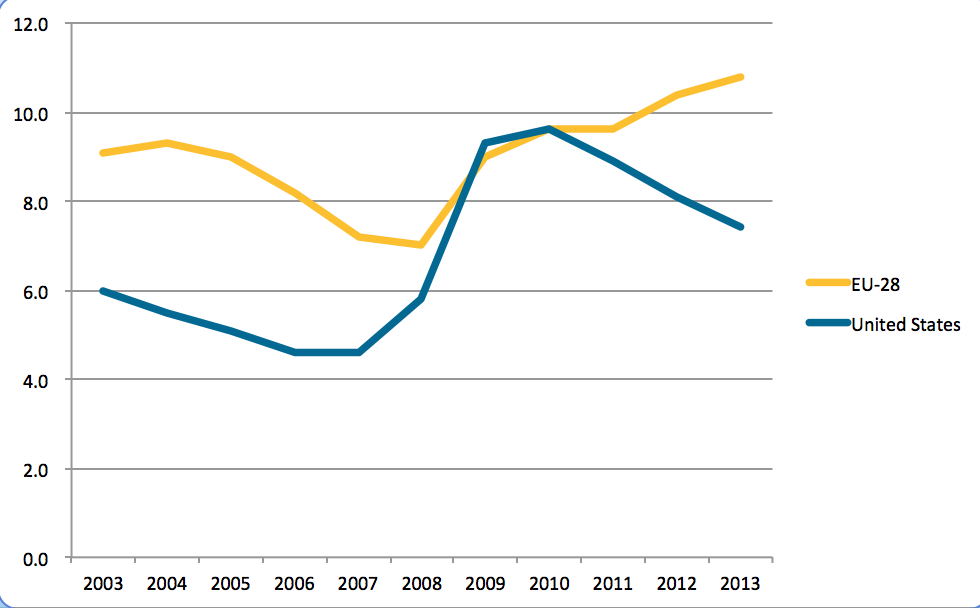
Silicon Valley has become a synonym for innovation and with its ecosystem of super venture capitalists it is world renowned as a hub for new products and software. However, as we teach on the digital innovation module for The Salford MBA: Digital Business, recent developments suggest that the tide of innovation is turning towards Europe.
Investments such as the £1m raised locally by Wakelet in December 2014 and TransferWise’s $58m in Janaury 2015 suggests that European startups are finally starting to attract interest on a global scale.
Innovation ecosystems and the start up market was studied by the University of Salford for the INNOPOLIS project. A key conclusion from the project and a critical success factor for innovation and startups cultures is the importance of University City Region. These are places where there is a concentration of intellectual capital and high levels of “risk happy” funding.
We line up the US and European situations in a head to head comparison of the key success factors for a startup…
Round 1: Startup culture – knowledge capital
Knowledge Capital image (CC) by Emilie Ogez
K and European universities do not generally perform well in the exploitation of intellectual capital. A simple indicator is the international Higher Education league table with only three of the top ten universities located in the UK. Not surprisingly, given their proximity to Silicon Valley, the California Institute of Technology, Berkeley and Stanford are at the top of this list.
With Silicon Valley on their doorstep all three institutions have successful business founders and entrepreneurs working in University posts, sharing their knowledge and looking for the next big innovations. This is culture of ‘giving back’ is not commonly found in European universities
In contrast, in the UK the “Golden Triangle” of top universities with the majority of research investment tends to be spread more widely across a cluster of universities – including Oxford and Cambridge as well as the London institutions.
Result: Europe 0 – US 1
Round 2: Startup culture – financial Capital
TechCrunch Disrupt Europe: Berlin 2013 (CC) by TechCrunch
The close relationship between the US higher education system and its high tech centres provides a direct supply chain of knowledge capital. However, innovation also requires the steady supply of financial capital. Recent figures provide some reassurance that the UK is becoming a nation of younger and female angels.
The internal boundaries of the European Union appear to be no barrier to innovation with investors happy to invest abroad and travel if and when needed. However, these positives for the European situation is no consolation for the largest startup investment infrastructure being based in the US. AngelList alone was able to raise over $100m in one year. This inequality in the ability to raise capital is evident at many levels.
Result: Europe 0 – US 2
Round 3: Startup culture – risk and failure culture
Swim at your own risk (CC) Todd Shaffer
Silicon Valley is based on a gold rush mentality. Make mistakes, learn and respond quickly.
In contrast, in European cultures, failure is perceived as a negative and a situation that is to be minimised and avoided at all costs. Social security systems, regulations and long procedures when it comes to establishing new business ventures are just some of the legacies that burden European innovation.
The recent Edelman Trust Barometer Survey of 27,000 respondents adds further insight regarding the European mindset. Built upon a desire for honesty and fair-play, an absence of trust impacts on the development of enterprising economies.
The attitude can be summarised as a constant tension between “fail safe” and “safe to fail” in the European startup ecosystem. The difference is captured in the innovation scoreboard assessment, which places US at the top of the list and outperforming Europe by 17%.
Result: Europe 0 – US 3
Round 4: Startup culture – necessity is the mother of invention
When it comes to the motivations to create a start up, not having work or low employment opportunities can sometimes be a good thing. Necessity is the mother of invention and if an individual has no other option and has nothing to lose they are more likely to ignore their lack of knowledge or financial capital and become less risk-averse.
Europe has now faced one of the largest economic crisis since the Second World War in which a number of “safe” jobs simply disappeared and has now resulted in pushing individuals into self employment.
Unemployment rate comparison European Union 28 states vs United States.
Unemployment in the European market means that more individuals are looking for work and some of these are considering the option of setting up their own business. To create a start-up culture there is a need for a critical mass of individual working with one another, bouncing around ideas and prepared to fail – and learn – together.
Although the UK economy fairs better than other European countries there is still competition with Germany for skilled immigrants into Europe.
Result: Europe 1 – US 3
Based on these criteria an entrepreneur wanting to make it big has more chance of success in Silicon Valley. However, there is some hope for UK entrepreneurs if they set themselves up near The Silicon Roundabout (or Tech City) in London.
If you can’t beat them – join them!
Follow your dreams, image (CC) by Chris Devers
Of course, positioning the US and European startup ecosystems as competitors is missing the biggest opportunity. The benefits of both locations are best realised through collaborations. Europe is, and is predicted to remain, in an economic position with a market receptiveness to innovation while the US is better able to bridge the gap from idea to realisation. This is a powerful combination that will fuel the next wave of intimate technologies including wearables, implantable and Electroencephalography (EEG) controlled devices.![]()
This article was originally published on The Conversation.
Read the original article.
By Aleksej Heinze, University of Salford; Gordon Fletcher, University of Salford, and Marie Griffiths, University of Salford





[…] Why Europe has no Silicon Valley: a head to head startup culture comparison […]
[…] Why Europe has no Silicon Valley: a head to head startup culture comparison […]
The beauty of a free country is to be able to disagree. And I completely disagree with you – mgriffiths Not sure who you are (one of the differences between the US and Europe :).
**one single reason is enough**
If you try to copy a leader it only testifies that you are a follower !!!! Anyone who tries to have their own “Silicon Valley” is be default a follower and cannot be a leader – and is far away of a thought leader – the base of Silicon Valley.
1) Knowledge Capital – Not important
Yes there are good universities in Silicon Valley – but guess what, most of the top leaders actually left before even graduating. Not because they know it all – because they want to create something new and not mess around for years learning something old.
2) Capital
You need to understand how capital flows. It’s like water, the law of physics steers water to the lowest point. The law of capital drives it always to the best opportunities. But that is not the reason why Silicon Valley has so much money.
And guess what: The large portion of capital comes from successful entrepreneurs – those successes are missed in Europe – hence no money. Even worst if somebody made money in Europe they put it into IBM, Siemens and BBC stocks not in startups. That is the real cultural difference.
3) Startup Culture
Yes, that is the core and the heart of Silicon Valley – but it has nothing to do with failure, not even risks. It has to do with relentless user and customer focus – learning as much and as fast as you can – making mistakes fast – not settling with an improvement but making it as good as possible – having no respect from anything that exist – question anything and even the law of physics…
4) Necessity
Ok – that’s fine and logically. However – just not applicable. Most of the kids are actually financially in good shape. But they have a bold vision. They are high up on the pyramid of needs. It’s all about self actuation. Mark Zuckerberg turned down a 900 Million offer from Yahoo. Obviously so much money could fill any conceivable necessity – except one: Self Actuation.
The unemployment rate? – oh come on guys do your homework. You are academics and used to do research right? In the US people who are longer than 2 two years unemployed do no longer count – as decided in 2009 😉
5) Resignation
“If you can’t beat them – join them” Yeah – what a solution. I live almost 20 years in Silicon Valley – haven’t heard that for a long time. LOL
But yes. I did by joining them in 1998 and learned everything I needed to learn. I started a successful company – competed with two east coast companies who had 15 times the money – yet completely ran over them 🙂 I did that after starting two very successful companies in Europe.
In reality the US and Europe are 100% equally successful:
* In the US we are deciding to win and have a high success rate doing just that.
* In Europe we are deciding to stay as low key as possible – and have an equally high success rate doing just that.